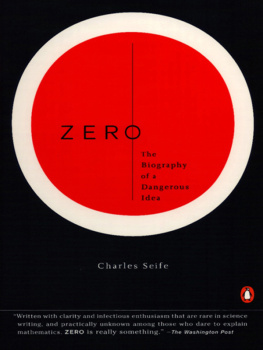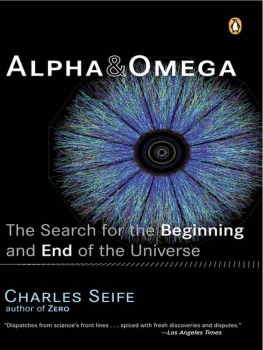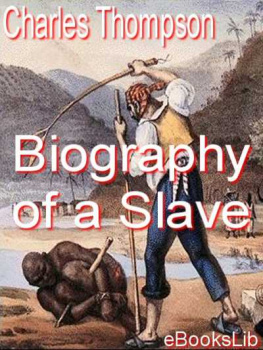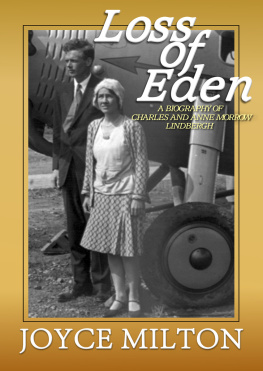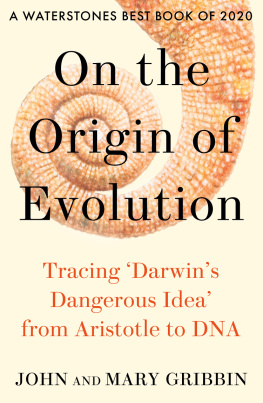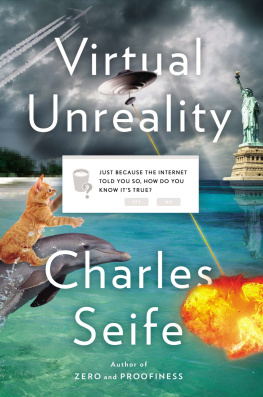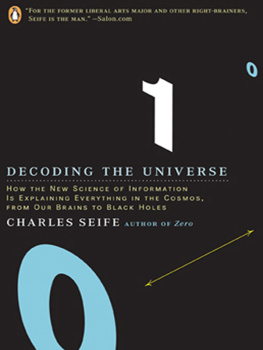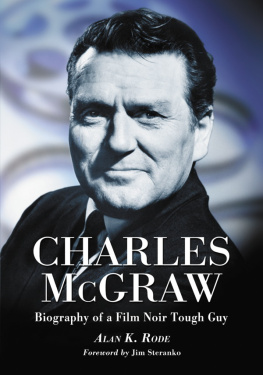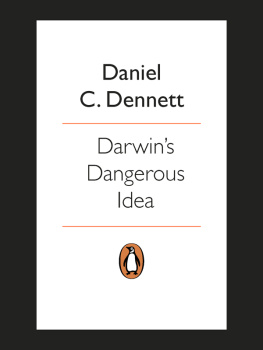Charles Seife - Zero: The Biography of a Dangerous Idea
Here you can read online Charles Seife - Zero: The Biography of a Dangerous Idea full text of the book (entire story) in english for free. Download pdf and epub, get meaning, cover and reviews about this ebook. year: 2000, publisher: Penguin Books, genre: Religion. Description of the work, (preface) as well as reviews are available. Best literature library LitArk.com created for fans of good reading and offers a wide selection of genres:
Romance novel
Science fiction
Adventure
Detective
Science
History
Home and family
Prose
Art
Politics
Computer
Non-fiction
Religion
Business
Children
Humor
Choose a favorite category and find really read worthwhile books. Enjoy immersion in the world of imagination, feel the emotions of the characters or learn something new for yourself, make an fascinating discovery.
- Book:Zero: The Biography of a Dangerous Idea
- Author:
- Publisher:Penguin Books
- Genre:
- Year:2000
- Rating:3 / 5
- Favourites:Add to favourites
- Your mark:
- 60
- 1
- 2
- 3
- 4
- 5
Zero: The Biography of a Dangerous Idea: summary, description and annotation
We offer to read an annotation, description, summary or preface (depends on what the author of the book "Zero: The Biography of a Dangerous Idea" wrote himself). If you haven't found the necessary information about the book — write in the comments, we will try to find it.
Zero: The Biography of a Dangerous Idea — read online for free the complete book (whole text) full work
Below is the text of the book, divided by pages. System saving the place of the last page read, allows you to conveniently read the book "Zero: The Biography of a Dangerous Idea" online for free, without having to search again every time where you left off. Put a bookmark, and you can go to the page where you finished reading at any time.
Font size:
Interval:
Bookmark:
* The Greek word for ratio was (logos), which is also the term for word. This translation is even more rational than the traditional one.
* One thing that sometimes helps is thinking of the wave function (technically, the square of the wave function) as a measure of the probability about where a particle will be. An electron, say, is smeared out across space, but when you make a measurement to determine where it is, the wave function determines how likely you are to spot the electron at any given point in space. This very smeariness of nature was what Einstein objected to. His famous statement, God does not play dice with the universe, was a rejection of the probabilistic way that quantum mechanics works. Unfortunately for Einstein, the laws of quantum mechanics work incredibly well, and you cant successfully explain quantum effects with traditional classical physics.
* To be precise, the Heisenberg uncertainty principle deals not with a particles velocity but with momentum, which combines speed, direction, and information about the particles mass. However, in this context, momentum, velocity, and even energy can be used almost interchangeably.
* Yes, mathematics can be beautiful or ugly. Just as its hard to describe what makes a piece of music or a painting aesthetically pleasing, its equally difficult to describe what makes a mathematical theorem or a physical theory beautiful. A beautiful theory will be simple, compact, and spare; it will give a sense of completeness and often an eerie sense of symmetry. Einsteins theories are particularly beautiful, as are Maxwells equations. But for many mathematicians, an equation discovered by Euler, e i? + 1 = 0, is the paragon of mathematical beauty, because this extremely simple, compact formula relates all the most important numbers in mathematics in a totally unexpected way.
* The early Babylonians were apparently unaware of the difficulty in trisecting an angle. In the Epic of Gilgamesh, the narrator states that Gilgamesh was two-thirds god and one-third man. This is as impossible as trisecting an angle with a straightedge and compassesunless gods and mortals are allowed to have an infinite amount of sex.
* This is a necessary, but not sufficient, condition. If the terms go to zero too slowly, then the sum of the terms doesnt converge to a finite number.
* One dating system had the year 1 based upon the founding of the city of Rome, and the other was based on the accession of the emperor Diocletian. To the Christian monk, the birth of his Savior was a more important event than the foundation of a city that had been sacked by Vandals and Goths a few timesor, for that matter, the beginning of the reign of an emperor who had an unfortunate penchant for maintaining his menagerie of exotic animals on a diet of Christians.
* When a computer programmer makes a program do something over and over, hell more than likely make the computer count from, say, zero to nine to make the computer take ten steps. A forgetful programmer might make it count from one to nine, yielding only nine steps instead of ten. More than likely a bug like this was what ruined an Arizona lottery in 1998. In drawing after drawing, a nine never appeared. They hadnt programmed it in, admitted a spokeswoman sheepishly.
* Tally sticks caused no end of trouble. The English Exchequer used to keep accounts on a variant of the tally stick until 1826. Charles Dickens told of the outcome of that long-outdated practice: In 1834, it was found that there was a considerable accumulation of them; and the question then arose, what was to be done with such worn-out, worm-eaten, rotten old bits of wood? The sticks were housed in Westminster, and it would naturally occur to any intelligent person that nothing could be easier than to allow them to be carried away for firewood by the miserable people who lived in that neighborhood. However, they never had been useful, and official routine required that they should never be, and so the order went out that they were to be privately and confidentially burned. It came to pass that they were burned in a stove in the House of Lords. The stove, over-gorged with these preposterous sticks, set fire to the panelling; the panelling set fire to the House of Commons; the two houses were reduced to ashes; architects were called in to build others; and we are now in the second million of the cost thereof.
* When Newton was three, his mother remarried and moved. Newton didnt accompany his mother and stepfather. As a result, he had little contact with his parents after that, unless you count the time he threatened to come over and burn their house down with them inside.
* If you multiply two numbers together and get zero, then one or the other must equal zero. (In mathematical terms, if ab = 0, then a = 0 or b = 0. ) This means that if a 2 = 0, then aa = 0, thus a = 0.
* Poncelets projective geometry brought about one of the oddest concepts in mathematics: the principle of duality. In high school geometry, you are taught that two points determine a line. But if you accept the idea of a point at infinity, two lines always determine a point. Points and lines are dual to each other. Every theorem in Euclidean geometry can be dualized in projective geometry, setting up a whole set of new theorems in the parallel universe of projective geometry.
Mathematicians, contrary to popular misconception, are often the most lucid of writers (Bertrand Russell won a Nobel Prize not in mathematics but in literature), and Seife is a welcome example. He writes with an understated charm that takes account of human fear, the mistakes of geniuses and the minds grandest ambitions.
Atlanta Journal Constitution
Zero emerges as a daunting intellectual riddle in this fascinating chronicle. With remarkable economy, Seife urges his readers to peer through the zero down into the abyss of absolute emptiness and out into the infinite expanse of space. Deftly and surely, Seife recounts the historical debates, then swiftly rolls the zero right up to the present day, where he plunges through its perilous opening down into the voracious maw of a black hole, and then out into the deep freeze of an ever cooling cosmos. A must read for every armchair physicist.
Booklist (starred review)
His narrativeshifts smoothly from history and philosophy to science and technology, and his prose displays a gift for making complex ideas clear.
The Dallas Morning News
Seife keeps the tone as light as his subject matter is deep. By books end, no reader will dispute Seifes claim that zero is among the most fertileand therefore most dangerousideas that humanity has devisedSeifes prose provides readers who struggled through math and science courses a clear window for seeing both the powerful techniques of calculus and the conundrums of modern physics. In doing sothis entertaining and enlightening book reveals one of the roots of humanitys deepest uncertainties and greatest insights.
Publishers Weekly (starred review)
Even innumeratescan appreciate the intricate web of conceptual connections Seife illuminates.
Boston Globe
The greater part of this book tells a fascinating human story with skill and witwe come to appreciate the surprising depth and richness of simple concepts such as zero and infinityand their remarkable links to the religion and culture of earlier civilizations and to present-day science.
The Philadelphia Inquirer
Seiferecounts his story as an accomplished science journalist, standing on the outside to bring clarity to complex ideas. the crisp explanations are refreshingstraightforward and bright.
The New York Times
Seife has a talent for making the most ball-busting of modern theoriesseem fairly lucid and common sensical.
Salon
Font size:
Interval:
Bookmark:
Similar books «Zero: The Biography of a Dangerous Idea»
Look at similar books to Zero: The Biography of a Dangerous Idea. We have selected literature similar in name and meaning in the hope of providing readers with more options to find new, interesting, not yet read works.
Discussion, reviews of the book Zero: The Biography of a Dangerous Idea and just readers' own opinions. Leave your comments, write what you think about the work, its meaning or the main characters. Specify what exactly you liked and what you didn't like, and why you think so.

